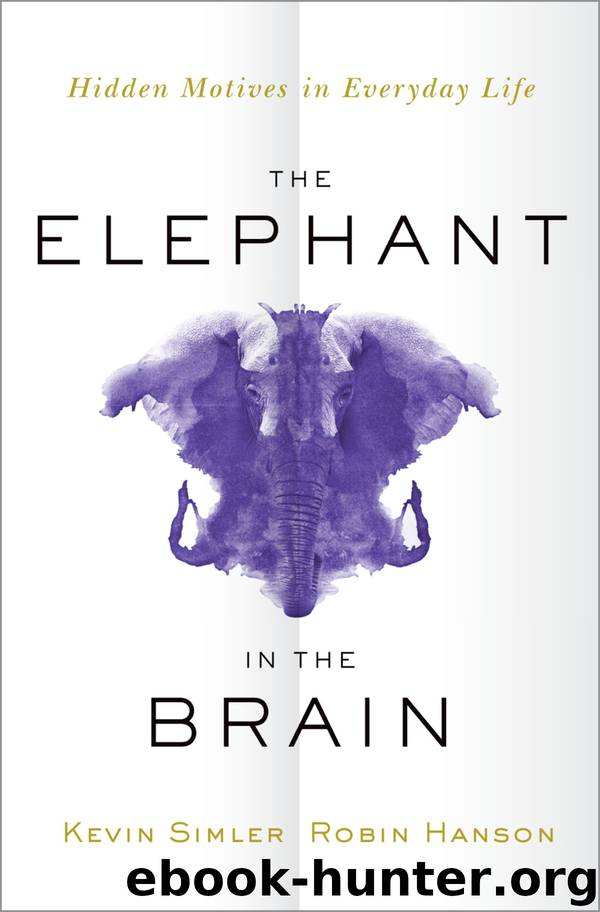The Elephant in the Brain by Simler Kevin; Hanson Robin;

Author:Simler, Kevin; Hanson, Robin;
Language: eng
Format: epub
Publisher: Oxford University Press
Published: 2017-01-15T00:00:00+00:00
EFFECTIVE ALTRUISM
To appreciate the contrast between our ideals and our actual behavior, it helps to portray what ideal charitable behavior looks like. Luckily, others have done this job for us.
In 2006, Holden Karnofsky and Elie Hassenfeld were working as hedge fund analysts in Connecticut. After making a comfortable living for a few years, they decided to donate a good portion of their earnings to charity. But they wanted to make sure their donations would be used effectively, so they began researching charities the same way they’d been trained to research investment opportunities, namely, by asking for data.
Along with a few friends, Karnofsky and Hassenfeld drafted up a list of promising charities and began reaching out for information. For each charity, they wanted to know how their donations would be spent, and more importantly, how the outcomes would be measured. They wanted to gauge how efficient the whole process was, in order to get the best bang for their charity buck. In financial terms, they were looking to maximize their return on investment (ROI)—or in this case, return on donation (ROD)—and were simply doing due diligence.4
The response from the charities they contacted was disheartening. Some simply sent glossy brochures with photos of smiling children and a few pat assurances that good work was being done. Other charities were hostile. One accused Karnofsky and Hassenfeld of attempting to steal confidential information on behalf of a competitor. (Take a moment to consider why a philanthropist might want to keep a “trade secret.”) Almost none of the charities responded with the kind of hard, outcome-oriented data that would satisfy a financial analyst.5
Eventually they realized that they weren’t getting the information they wanted “because the charities themselves didn’t have it.”6 But still Karnofsky and Hassenfeld thought the data was important, and they thought other donors would want it too. So in 2007, they decided to leave their jobs and start GiveWell, an organization dedicated to doing (and publicizing) quantitative research on different charities in order to determine which are the most effective, that is, have the highest ROD. This is similar in spirit to the approach taken by Consumer Reports or the Motley Fool, but instead of researching cars and cameras or stocks and bonds, GiveWell researches charities.
GiveWell now sits at the center of a growing social movement called effective altruism. Inspired by the work of Singer (along with Karnofsky, Hassenfeld, and others), effective altruists hope to change how people donate their time, effort, and money to good causes. And they’re using reason and evidence where others have relied mostly on emotion and gut instinct. This is a hard-nosed, data-driven approach that looks above all for results. In deciding how to give, effective altruists follow their heads, not their hearts.
This approach sounds sensible enough, but it can lead to some strange conclusions. In 2015, for example, GiveWell listed these as its three most effective charities:
1.The Against Malaria Foundation, which brings mosquito nets to sub-Saharan Africa.
2.GiveDirectly, an organization that distributes cash directly to people in need, no strings attached(!).
Download
This site does not store any files on its server. We only index and link to content provided by other sites. Please contact the content providers to delete copyright contents if any and email us, we'll remove relevant links or contents immediately.
The Art of Thinking Clearly by Rolf Dobelli(10443)
Mindhunter: Inside the FBI's Elite Serial Crime Unit by John E. Douglas & Mark Olshaker(9313)
Change Your Questions, Change Your Life by Marilee Adams(7753)
Nudge - Improving Decisions about Health, Wealth, and Happiness by Thaler Sunstein(7689)
Mastermind: How to Think Like Sherlock Holmes by Maria Konnikova(7313)
The Power of Now: A Guide to Spiritual Enlightenment by Eckhart Tolle(5744)
Men In Love by Nancy Friday(5231)
Altered Sensations by David Pantalony(5092)
Factfulness: Ten Reasons We're Wrong About the World – and Why Things Are Better Than You Think by Hans Rosling(4730)
The Confidence Code by Katty Kay(4248)
Thinking in Bets by Annie Duke(4216)
Man and His Symbols by Carl Gustav Jung(4127)
The Worm at the Core by Sheldon Solomon(3483)
Why Buddhism is True by Robert Wright(3446)
Liar's Poker by Michael Lewis(3440)
Three Women by Lisa Taddeo(3421)
The Inner Life of Animals by Peter Wohlleben(3303)
Descartes' Error by Antonio Damasio(3270)
How Music Works by David Byrne(3257)
